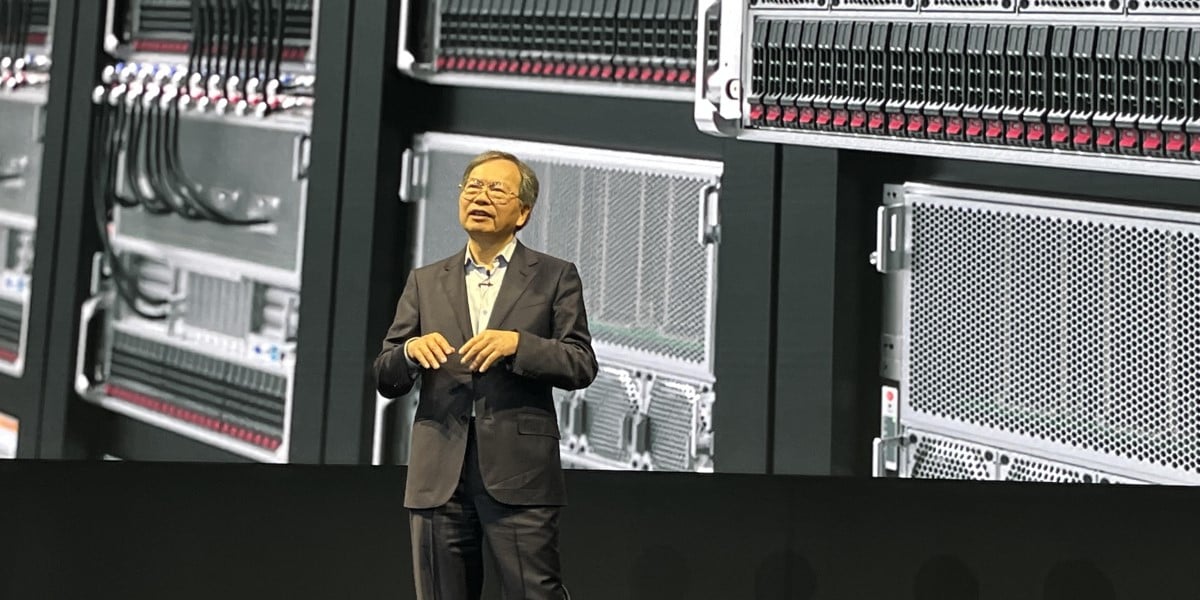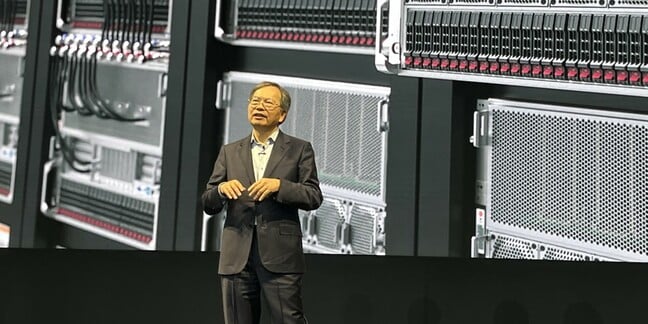What Supply Chain Crisis? Supermicro Lifts Rack-scale System Production

Computex Supermicro CEO Charles Liang has revealed his business has is poised to increase its production of rackscale systems by 25 percent.
"Currently we have the capacity to design and deliver up to 4,000 racks per month from our global manufacturing facilities," Liang said. "Later this year our capacity will accelerate to 5,000 racks a month. With up to 7.5 megawatts of power alone," he added.
Liang emphasized that Supermicro's rack-scale systems feature its own motherboards, servers, storage arrays, and chassis, and that the org he leads is "a one-stop shop" for custom rigs. He pitched the offering as capable of delivering datacenter infrastructure to enterprises "within a few weeks of receiving an order, instead of a few months."
Watch out, Lenovo, Dell, and HPE, because Supermicro's rack-scale systems are tuned to the needs of specific apps and shipped ready to put into production.
The CEO was joined on stage by execs who boasted Supermicro has "inventory right now to ship directly to our customers," with lead times reduced from three to two weeks.
A second speaker talked up liquid cooling as an option for rack-scale systems, asserting that Supermicro engineers have made the tech "as dry as the Sahara desert."
Liang responded that it rains in the Sahara sometimes, making that a less-than-apt comparison.
The Computex crowd appreciated that rare moment of on-stage hype-pricking.
They'd earlier appreciated Liang being joined on stage by Nvidia CEO Jensen Huang. Liang and Huang were both born in Taiwan, and made colossal fortunes in the USA. Both moguls founded their empires in 1993 and remain in charge to this day.
Everyone loves a local who makes it to the top, and the Computex crowd loved the double act of Huang and Liang. The Nvidia boss was humored as he went through the same spiel – forget CPUs, build computers around accelerators instead – that he delivered earlier in the week.
- Taiwan's titans bullish on challengers to x86 in the datacenter and beyond
- WTF is solid state active cooling? We’ve just seen it working on a mini PC
- Nvidia creates open server spec to house its own chips – and the occasional x86
- Intel says AI is overwhelming CPUs, GPUs, even clouds – so all Meteor Lakes get a VPU
Huang added a little detail to the rationale behind the MGX server spec he announced last Monday, explaining that its modular design was created to give buyers both a common platform and the chance to customize machines to meet the needs of different classes of application.
Liang seemed enthusiastic about the prospect of slinging MGX boxes – at least in the context of his belief that AI is jolly important and people are going to do lots of it.
Huang thinks it's so important that users will soon realize that doing it in clouds is too expensive and they'll be better off buying MGX boxes to run AI on-prem.
Which left the crowd applauding two locally born billionaires as they articulated more reasons to buy their respective products – but happy nonetheless.
Or mostly happy. The Register sat next to a pair of photographers wielding what looked like pro-grade kit. Both left the keynote after Nvidia's Huang left the stage – leaving Liang to talk rack-scale kit, petabyte-scale storage arrays, and liquid cooling, without long lenses trained on his remarks. ®
From Chip War To Cloud War: The Next Frontier In Global Tech Competition
The global chip war, characterized by intense competition among nations and corporations for supremacy in semiconductor ... Read more
The High Stakes Of Tech Regulation: Security Risks And Market Dynamics
The influence of tech giants in the global economy continues to grow, raising crucial questions about how to balance sec... Read more
The Tyranny Of Instagram Interiors: Why It's Time To Break Free From Algorithm-Driven Aesthetics
Instagram has become a dominant force in shaping interior design trends, offering a seemingly endless stream of inspirat... Read more
The Data Crunch In AI: Strategies For Sustainability
Exploring solutions to the imminent exhaustion of internet data for AI training.As the artificial intelligence (AI) indu... Read more
Google Abandons Four-Year Effort To Remove Cookies From Chrome Browser
After four years of dedicated effort, Google has decided to abandon its plan to remove third-party cookies from its Chro... Read more
LinkedIn Embraces AI And Gamification To Drive User Engagement And Revenue
In an effort to tackle slowing revenue growth and enhance user engagement, LinkedIn is turning to artificial intelligenc... Read more


